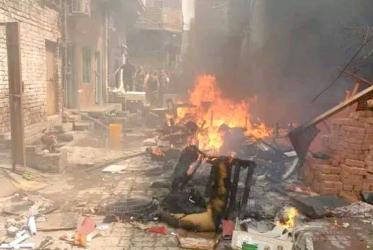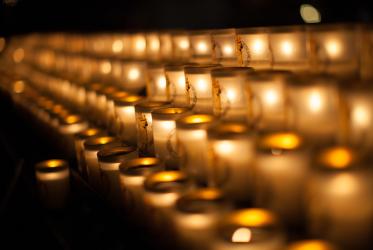WCC Central Committee, Geneva, 6 August-2 September, 2003
The Central Committee of the World Council of Churches meeting at Potsdam,
Germany in February, 2001, adopted a document entitled: The Protection of Endangered
Populations in Situations of Armed Violence: Towards an Ecumenical Ethical Approach.
It commended the document "for further study, reflection and use - as they may
deem appropriate - in their continuing dialogues with policy makers, governments,
international organizations, research bodies, groups advocating large scale
non-violent civilian intervention and other peace initiatives, and with civil society
at large". The churches were requested to share the results of these studies,
reflections and dialogues and the Commission of the Churches on International
Affairs (CCIA) was asked to report back to the Central Committee at a later date.
The members of the Central Committee have received as background documentation
CCIA's 2003 report entitled The Responsibility to Protect: Ethical and Theological
Reflections. The report recalls the process that led to the presentation of the above
document at Potsdam. It contains the summary of reactions received from churches,
refers to other relevant documents on the subject, identifies elements to be
included in the proposed follow up process and makes recommendations to the
Central Committee.
Since the adoption of the document by the Central Committee at Potsdam there
have been a number of significant events like the September 11th terrorist attacks
in the United States, the consequent military strikes in Afghanistan and more
recently, the war in Iraq and the military intervention in the Solomon Islands,
that have added new dimensions to the debate on "humanitarian intervention".
There is also a growing fear by many people in the world of attacks on innocent
civilians and of correlated responses by governments to curtail civil liberties. These
situations further underline the role of the United Nations and international law.
In the period since the 2001 Central Committee, only a few churches and related
groups have studied and reflected on this issue and have produced documents
and other materials which they have shared with the CCIA. While most of the
churches have not formally taken any action, they have expressed that they consider
the issue of the protection of endangered populations of great significance.
Circles outside the ecumenical movement too have been debating this issue at the
non-governmental and inter-governmental levels.
The CCIA's 2003 report underlines the importance of having an appropriate title
for the document; the need to deepen and clarify the ethical and theological criteria
for discernment; and the importance of reflecting on issues of human security,
sovereignty, human rights, international law, democracy and other concerns.
Finally, the report points out the divergence of views amongst the churches as
indicated in their responses on just peace and the use of military force as a last
resort. While some churches have specific criteria for the use of force others are
critical of exercising this option.
The Central Committee of the World Council of Churches meeting in Geneva,
26 August to 2 September, 2003 therefore:
Receives the report of the CCIA "The Responsibility to Protect: Ethical and Theological
Reflections as directed by it at the meeting in Potsdam, February 2001, and endorses
its recommendations.
Expresses its appreciation to the churches and related ecumenical groups that
have responded to its call for study and reflection.
Encourages member churches to continue the study process and to share their
insights with the CCIA.
Requests the CCIA:
to continue the study process, within the framework of the Decade to Overcome
Violence (DOV) and in consultation with the DOV Reference Group;
to collaborate closely with ecumenical organizations that are working on this
issue and taking into consideration the emerging developments;
to keep the churches and academic institutions involved in the study process;
to report back to the next WCC Assembly.


